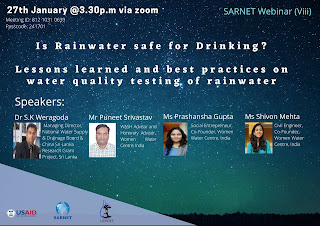Water Management experts from South Asia Region highlight the need for exploring alternative sources due to the increased demand for water with the Covid 19 pandemic
The 3rd
in the series the webinar organized by South Asia Rainwater Harvesting
Network(SARNET):
“Covid 19, Rainwater Harvesting; Issues, challenges, and best practices”
concluded on the 29th of January 2021 with the active participation
of 20 water management experts, activists and government representatives from
South Asia.
Rajindra Ariyabandu Chairman of the Lanka Rainwater Harvesting Forum opening the discussion highlighted the benefits of rainwater harvesting facility during the Covid-19 lockdown for communities in Sri Lanka. A Lanka Rainwater Harvesting Forum survey of rainwater harvesting households during the first wave of Covid 19 revealed that 92% of the households surveyed in 3 dry zone districts of Sri Lanka benefitted during the lockdown as they had adequate water at their home for drinking, hand washing,
and cleaning purposes. The findings also revealed that 19% shared the water available in the rainwater harvesting tanks with others.
Dhanushi
Senanayake Coordinator for the Regional Center of Lanka Rainwater Harvesting
Forum updated on the progress of SARNET. At present the network has 30 members
out of which 19 have updated their details on the Google form provided. SARNET's
presence is maintained on the social media platforms of Facebook, Linked In, and
Instagram. As part of SARNET activities already 2 webinars have been conducted
and the current webinar is the 3rd in the series. As for future
activities, the network plans to complete and launch the website, continue the
webinar series, organize a hybrid symposium, develop publications, and explore
fundraising opportunities said Dhanushi. She also requested from participants update details if they have not updated so far and send content to be
featured on the SARNET website.
The speakers at this webinar were Dr
Suresh Kumar Rohilla Senior Director from Center for Science and
Environment(CSE) India and Md Motaleb Hossain Sarker Director, Water Resources Management Division
Center for Environmental and Geographic Information Services from CEGIS
Bangladesh and moderated by Han Heijnen from the
International Rainwater Harvesting Alliance. In India where already groundwater has
been extensively and excessively used and, with the Covid-19 situation the
domestic water demand is expected to grow from 40 to 55 trillion liters said Dr
Suresh Kumar Rohilla. He further stated that in areas where earlier groundwater was extracted from 20 Ft now have to extract from 250 to 300 ft below
ground level. In such a situation, greater use of collected rainwater gives
better service near the home Engineer Md Motaleb Hossain of CEGIS shared an
update on water usage during Covid and the potential of rainwater harvesting in
the context of Bangladesh. In Bangladesh, the safe
water coverage is still only 55%, and in areas with arsenic contamination and
salinity in water rainwater harvesting is practiced. Rainwater harvested is
used for drinking and
cooking by 57 % while 18% uses for cleaning and bathing and 42% is used for all
purposes. Covid 19 puts extra pressure on the water supply in urban areas. Water
use has increased tremendously and at the family level at least 30% to 40% is used for
frequent handwashing, disinfecting groceries with soap water, and taking showers
multiple times. In Bangladesh arsenic contamination is also a silent hazard.
According to WHO arsenic contamination affects 35 million people in Bangladesh.
Annually 200 to 250 billion cubic meters of water is generated from the rain in Bangladesh.
Pakistan
with the view to promoting rainwater harvesting has constructed 40,000 units
after the 2005 earthquake that affected the Northern mountainous parts of the
country. The government of Pakistan has initiated a climate-resilient urban
development policy that includes rainwater harvesting said Zaheed Gardezi,
representing the Government of Pakistan, upon sharing an update about the
country during the discussion in the webinar.
Adding to the discussion Han Heijnen suggested that When the government
introduces water supply systems such systems should not replace the water
harvesting mechanisms adopted by communities. Tarayana Foundation from Bhutan
requested participants to share information regarding rainwater harvesting
practices that can be applied particularly for hilly areas in the country. Raah
Foundation from India shared an observation that introducing water structures
managed by communities helps to create a sense of ownership, and belonging, and maintain equal distribution and judicious management of water. Han Heijnen as
suggestions for topics of the next webinar mentioned; “How does availability of
rainwater harvesting offer hope and opportunity for women, disabled, and the
elderly?” Dr. Rohilla explained that water and sanitation should go hand in hand
and thus should be discussed together. Upon
concluding the webinar, the webinar moderator Han Heijnen
of the International Rainwater Harvesting Alliance highlighted: “Rainwater
harvesting is an opportunity to become more resilient”.


Comments
Post a Comment